More Rays of Winter Sunshine in Syria?
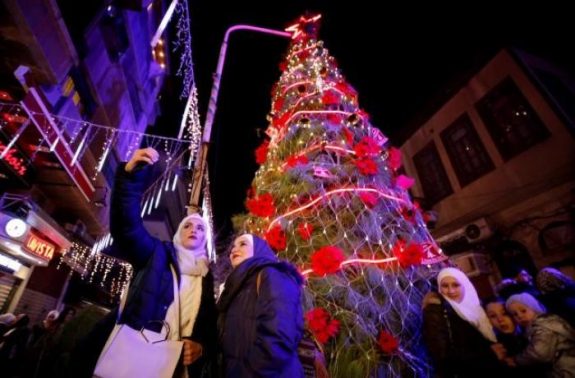
By Denis Bright
Intrigues Beyond the Christmas Cheer
Join me with the resources available from accredited block quotes to come to terms with the situation in war-torn Syria. There is more cheer in parts of Syria than I offered a year ago in a similar article for The AIM Network. Even then, I was guardedly optimistic.
Australia could do much more in the battles against global warming and unilateralism in strategic policies with a more innovative economy and a return to more independent and Whitlamesque (in the spirit of Gough Whitlam) foreign policies which both major parties abandoned after the Dismissal in 1975 to follow most directives from the US Global Alliance through the Australia-United States Ministerial Consultations (AUSMIN) which has never given full membership to New Zealand because of its more independent foreign policies and social market economic strategies.
People living in far-off developed countries like Australia and Canada have the capacity to foster a way out of the despair of the Syrian civil war. Australia’s assistance to NGOs such as the Red Cross and the UN Refugee Agency (UNHCR) is legendary.
The grim statistics of the refugee exodus from Syria has been well summarised by the UNHCR:
After eight years of war, Syrians are struggling to survive. Over 5.6 million men, women, and children have fled to neighbouring countries, where they live in extreme poverty – unable to keep food on the table or a roof over their heads. Inside Syria, a further 6.2 million people are suffering as the war rages on around them.
This refugee exodus from Syria placed an enormous burden on adjacent countries. Its impact extends across Europe from the Balkans and Greece. In European social democracies, it has been a destabilising influence which has contributed to the rise in support for far-right political movements particularly in Germany and Austria where far-right political movements are flourishing for the first time since 1945.
Within Syria and adjacent parts of Iraq, the civil unrest fostered temporary gains by IS as part of a new transnational caliphate. Australia responded to the call from the US Global Alliance to contain the spread of ISIS.
This was one overseas strategic commitment in which Australia showed a degree of independence within the US Global Alliance. The limited scope of Australia’s strategic commitments against IS were well defined in a Parliamentary Paper released on 20 September 2017. I recommend a look at both the executive summary and the full report.
Australian military operations in Iraq commenced in August 2014 as part of the International Global Coalition to counter the Islamic State in Iraq and Syria (IS. A year later, on 9 September 2015, Prime Minister Tony Abbott announced Australia would expand its military commitment from Iraq into Syria to conduct operations against IS militants located there. At the time, he said this would ‘help protect Iraq and its people from [IS] attacks inside Iraq and from across the border’.
Military action in Syria was not explicitly authorised by any UN Security Council (UNSC) resolution. However, on 10 September 2014, Attorney-General George Brandis explained the Coalition Government’s legal basis for these operations. He noted Australian actions were He de ‘firmly grounded in international law’ and based on the principle of collective self-defence of Iraq under Article 51 of the UN charter.
At the time, the Government was careful to highlight that Australia’s military objectives and involvement were limited to targeting ISIS through air strikes, rather than pursuing any broader political objectives aimed at unseating the Syrian regime. Under Prime Minister Turnbull the Coalition Government has continued to emphasise that the objective in Syria is to ‘degrade, destroy and defeat’ ISIS. But beyond this there has been no substantial public discussion or parliamentary debate about any long-term plan or strategy in Syria or Iraq, despite the conflict’s evolution and the impending conclusion of major urban military operations against the group.
Operation Okra is the Australian Defence Force’s (ADF) contribution to the international, US-led operations against ISIS in Iraq and Syria. As of June 2017, about 780 Australian personnel are deployed to the Middle East as part of this mission. They are split across the Air Task Group (the only element to operate in Syria and Iraq), Task Group Taji in Iraq and the Iraq-based Special Forces contingent. The ADF contribution is part of a 9,000-strong troop commitment from 23 countries, although 72 nations are part of the broader Operation Inherent Resolve (OIR) Coalition to counter ISIS and provide non-military assistance such as finance, equipment, humanitarian and logistics support.
Throughout the conflict, the overall number of Australian sorties (or air missions) in Syria has remained relatively constant, although that effort has been a small proportion of the overall Australian effort in Iraq and Syria, and an even smaller proportion of the overall – US-dominated – OIR Coalition effort. To date, the ADF has not been involved in any incidents where significant civilian casualties have been proven, though the question of responsibility for civilian casualties is a persistent issue for OIR Coalition operations as a whole.
The conflict is at a significant turning point as the Iraqi Government claims victory over IS within its territory and the Syrian Government strengthens its control over areas previously held by the group. This raises a number of questions around strategy, future intent and the durability of any current solution, as arguably, while ISIS’s defeat was a necessary operational goal, it leaves wider strategic issues unresolved. However, while the Australian Government constantly reiterates the importance of dealing with ISIS, its intentions remain unclear beyond the destruction of the group, including in relation to key inter-linked issues such as aid and reconstruction efforts and the future role of Assad.
There was always a risk that air and ground operations against ISIS enclaves from the Mediterranean to the borders of Iran would involve US Coalition forces into more regime change strategies, particularly against the military assets of the Assad Government in Syria. The Abbott Government was sloppy in its deployment strategies which could have led Australia into deep currents completely beyond our control.
Almost forgotten by the passage of time were the accidental bombing of Syrian forces (Anthony Green, ABC News, 30 November 2016):
Two Australian hornets dropped six bombs as part of botched coalition air strikes which killed dozens of Syrian forces earlier this year, a US-led military investigation has confirmed.
In September, coalition aircraft accidently bombed forces aligned to the Syrian government in an operation around the Deir al-Zor military airport in Syria’s east, which was supposed to target fighters in the Islamic State (IS) terrorist group.
Russia claims as many as 83 people were killed.
The investigation blamed “unintentional human errors” for the deadly mistake, while Australia’s Defence Department has confirmed two RAAF hornets dropped bombs in the incident. The department said there will be improved information sharing among coalition partners following the review, but no coalition personnel will be sanctioned.
Good luck prevented the escalation of such incidents into another amateurish regime change in Syria along the precedents from Iraq or Libya and a few dozen coup d’état strategies which littered the Cold War history for half a century.
Apart from protection of some Kurdish oilfields in North Eastern Syria, the US has largely withdrawn from ground operations against the Assad Regime. The withdrawal of some U.S. special operation forces from Syria in late October 2019 shocked the security establishment in Washington as reported in the Department of State’s Foreign Policy Journal.
This erratic change in US foreign policy has produced a pragmatic adjustment by Kurdish leaders in North Eastern Syria as reported in an opinion piece in the New York Times on 13 October 2019 that was jointly written under the auspices of Ben Hubbard, Charlie Savage, Eric Schmitt and Patrick Kingsley:
DOHUK, Iraq – Kurdish forces long allied with the United States in Syria announced a new deal on Sunday with the government in Damascus, a sworn enemy of Washington that is backed by Russia, as Turkish troops moved deeper into their territory and President Trump ordered the withdrawal of the American military from northern Syria.
The sudden shift marked a major turning point in Syria’s long war.
For five years, United States policy relied on collaborating with the Kurdish-led forces both to fight the Islamic State and to limit the influence of Iran and Russia, which support the Syrian government, with a goal of maintaining some leverage over any future settlement of the conflict.
On Sunday, after Mr. Trump abruptly abandoned that approach, American leverage appeared all but gone. That threatened to give President Bashar al-Assad and his Iranian and Russian backers a free hand. It also jeopardized hard-won gains against the Islamic State-and potentially opened the door for its return.
The Kurds’ deal with Damascus paved the way for government forces to return to the country’s northeast for the first time in years to try to repel a Turkish invasion launched after the Trump administration pulled American troops out of the way.
This rapprochement with the Kurds provides the Syrian Government with an opportunity to reassert control of Idlib Province where the Syrian Free Army (SFA) still has enclaves of support close to Aleppo.
The likelihood of Turkish forces intervening on behalf of the SFA has been lessened by Turkey’s dispute with Saudi Arabia over the assassination of Jamal Khashoggi at the Saudi Consulate in Istanbul as reported by Bethan McKernan in The Guardian (24 December 2019):
Five men have been sentenced to death and another three face a total of 24 years in prison for their roles in the gruesome murder of the dissident journalist Jamal Khashoggi at the Saudi consulate in Istanbul last year, the Saudi public prosecutor’s office has said.
Eight of the 11 people on trial were found guilty of the killing, which triggered the kingdom’s biggest diplomatic crisis since the 9/11 attacks as world leaders and business executives sought to distance themselves from Riyadh.
However, the investigation concluded “the killing was not premeditated … the decision was taken at the spur of the moment,” the deputy public prosecutor and spokesperson Shalaan bin Rajih Shalaan said, reading the verdict in the Saudi capital on Monday. Three senior figures, including the de facto ruler Crown Prince Mohammed bin Salman’s former top adviser, Saud al-Qahtani, were cleared of wrongdoing during the trial.
The verdict contradicts the conclusion of the CIA and other western intelligence agencies that Prince Mohammed directly ordered Khashoggi’s assassination, an allegation the kingdom has strenuously denied.
Just as outrageous is the decision of the US Government to keep the proceeds from the oilfields under protection in North Eastern Syria (BBC News, 21 November 2019):
President Donald Trump says he expects the United States to benefit by millions of dollars per month from Syria’s oil revenues while US troops remain in the country.
The Syrian President Bashar al-Assad has responded by accusing the US of “stealing oil” from his country and Russia, a major supporter of Mr Assad, has called it “international state banditry”.
So, who currently controls Syria’s oil production and who benefits from it?
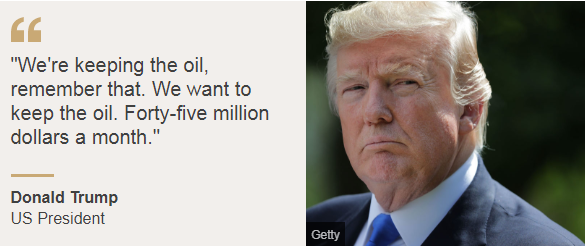
The US announced a withdrawal of its forces from northern Syria in October but has since said it would retain around 500 troops to guard oil facilities, along with Kurdish-led forces, who are currently the main beneficiaries of the production.
US Defence Secretary Mark Esper has said US troops are there to guard against not only Islamic State fighters but also Russian and Syrian government forces.
For their part, Russian forces are helping Syrians try to regain control of oil production and have their eyes on these facilities.
The two countries signed an energy co-operation agreement in 2018 giving Moscow exclusive rights to rebuild the Syrian oil and gas sector.
It’s in this context that President Trump has declared his own interest in benefiting from the oil his troops are defending.

The oil and gas sectors have been a crucial contributor to Syrian government revenues, even though its reserves are small compared with those of other countries in the Middle East.
In 2018, Syria had an estimated 2.5 billion barrels of oil reserves, compared with Saudi Arabia’s 297 billion, Iran’s 155 billion and Iraq’s 147 billion barrels.
The oil fields are concentrated in the province of Deir al-Zour, in eastern Syria, near the Iraqi border, and Hassakeh in the north-east.
But the country’s oil production has collapsed since the conflict began in 2011.
In 2008, Syria produced 406,000 barrels per day (bpd), according to the British Petroleum Statistical Review of World Energy for 2019.
In 2011, production dropped to 353,000 bpd and had plunged to just 24,000 bpd by 2018 – a reduction of more than 90%.

The Syrian government lost control of most of the country’s oil fields to the Syrian opposition groups and later the so-called Islamic State (IS), as the civil war escalated.
By 2014 IS had managed to seize most of the fields in eastern Syria, including the largest, al-Omar, in Deir al-Zour province. Oil sales became one of the biggest sources of income for the militant group, earning it about $40m a month in 2015, according to the US Department of Defence.
IS lost control of the Syrian oil fields it held to the Kurdish-led, US-backed Syrian Democratic Forces (SDF) after the jihadists were defeated in their last stronghold in the east.
Syrian oil fields suffered considerable damage due to US airstrikes in an effort to disrupt one of the group’s main sources of revenue.
IS militants also destroyed much of the oil infrastructure when it became apparent that the oil fields would fall to Kurdish forces.
The latest edition of the conflict maps in Syria shows the location of oil and gas fields across Syria with a concentration of the oil fields in Kurdish ethnic areas of North Eastern Syria. This adds another dimension to the strategic significance of Syria as energy resources can easily be piped to the Mediterranean coast for export to Balkan and European countries.
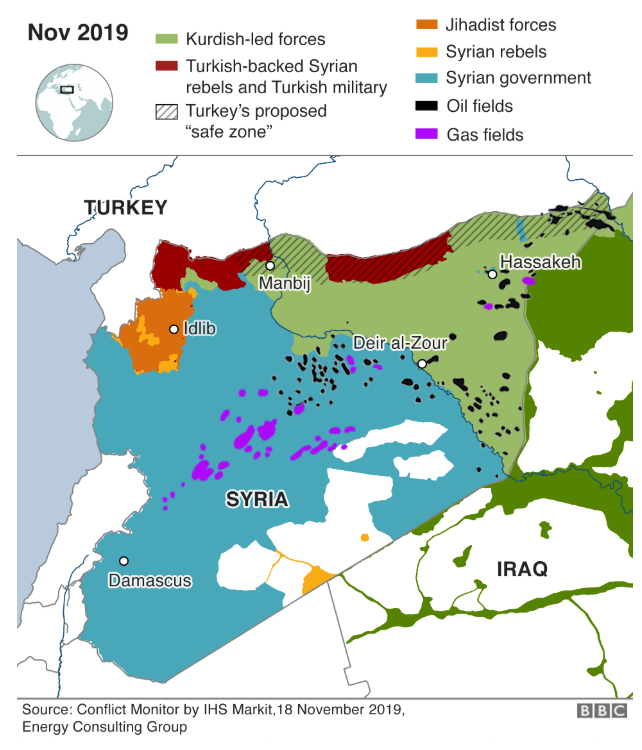
Removing the FSA from Idlib Province near Aleppo will be a bloody affair which continues into the Christmas period as reported by Al Jazeera (25 December 2019):
The Idlib region has seen an uptick in violence in recent days as Syrian government forces supported by Russian air attacks have launched a fresh assault to capture one of the largest urban centres in the area.
Syrian President Bashar al-Assad‘s government has repeatedly promised to take back the area, and bombardment has continued despite a ceasefire announced in August.
The United Nations estimates that some 60,000 people have fled from the area, heading south, after the bombings intensified earlier this month. Thousands more have fled further north towards the Turkish border in recent days.
Turkish President Recep Tayyip Erdogan has repeatedly said Ankara cannot handle a new refugee flow on its own.
On Tuesday, at least eight people, including five children, were reportedly killed as missiles hit a school in northwest Syria sheltering displaced civilians.
Activists blamed Russia, al-Assad’s main ally in the war, for the missile attack that hit the Jobas village school. Five children and a woman were among the dead, according to the Britain-based monitor Syrian Observatory for Human Rights. Local journalists also reported the same death toll.
Syria After Current Winter Chills
With the partial re-alignment of the Syrian Kurds with the Assad Government, the Free Syrian Army (FSA) is now the major opponent of Syrian unification. Recent reports do suggest that the FSA has been transformed into a decentralised Syrian National Army (SNA) which operates perilously close to Aleppo with pragmatic support from the Turkish government which has occupied a 50 kilometre buffer zone along the Syrian border (Anadolu Agency AA 9 October 2019).
Allowing the SNA to conduct hit and run operations across Idlib and close to Aleppo is a major barrier to Syrian unification and future prospects for the energy pipelines to the Mediterranean.
In Aleppo itself, rail services have resumed to Damascus as noted in the International Railway Site-Seat 61):
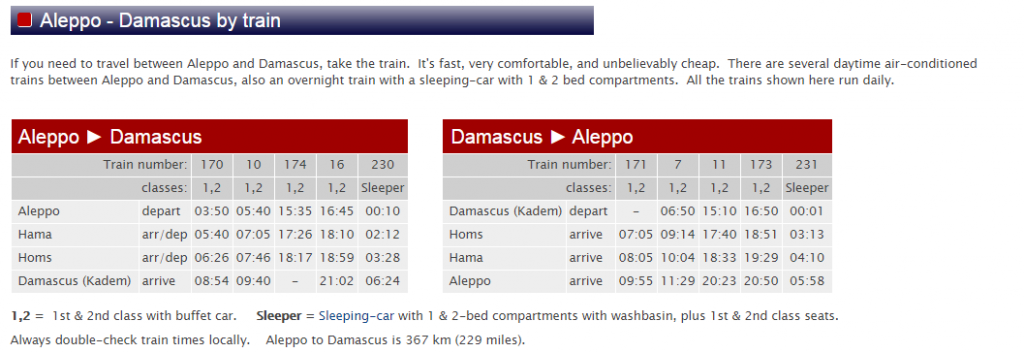


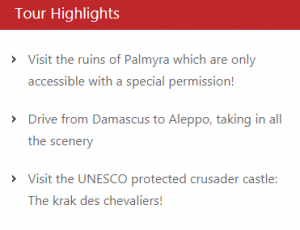 Life is getting back to normal in Southern and Central Syria and once disputed enclaves are being opened to the first foreign tour groups into Syria
Life is getting back to normal in Southern and Central Syria and once disputed enclaves are being opened to the first foreign tour groups into Syria
Young Pioneer Tours is planning follow up visits to the more stable parts of Syria from Beirut and then into some contested territory where SNA Units might still operate if the Idlib Incursions by the Syrian government are not finalised.
The winter weather in Damascus is a little crisp but Christmas has passed comparatively peacefully with mutual tolerance between the mainstream faiths in a predominantly Moslem country.
Catholic churches and welfare agencies such as Caritas have a long presence in Syria:
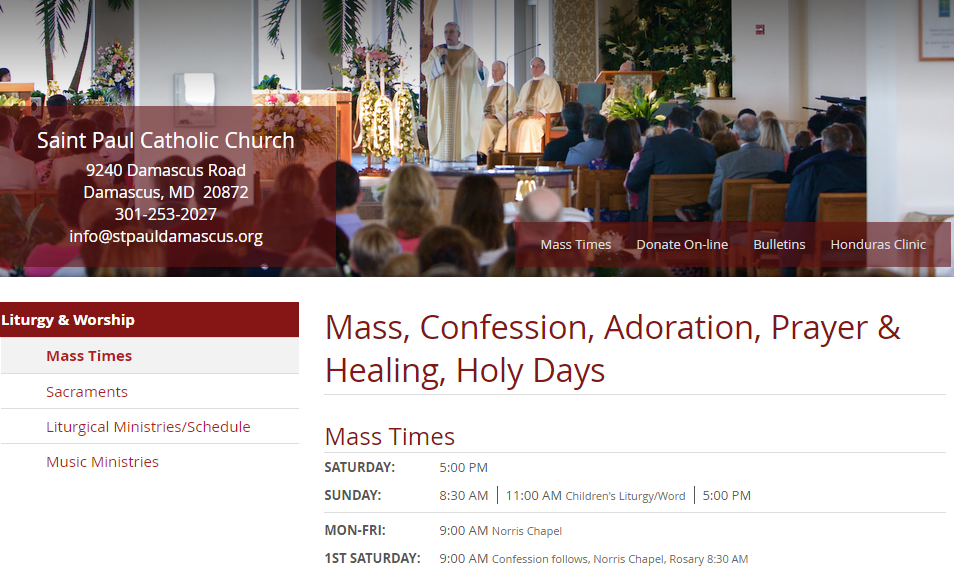
Caritas has stayed with welfare problems in Syria since 1954. It is now working to assist with reconciliation and reconstruction.
Having fostered the restoration of Catholic services in the Greek Catholic Church in the old city of Aleppo, Pope Francis has taking diplomatic initiatives to support the plight of refugees in Idlib Province and in localities devastated by IS (Rome Report and AFP).
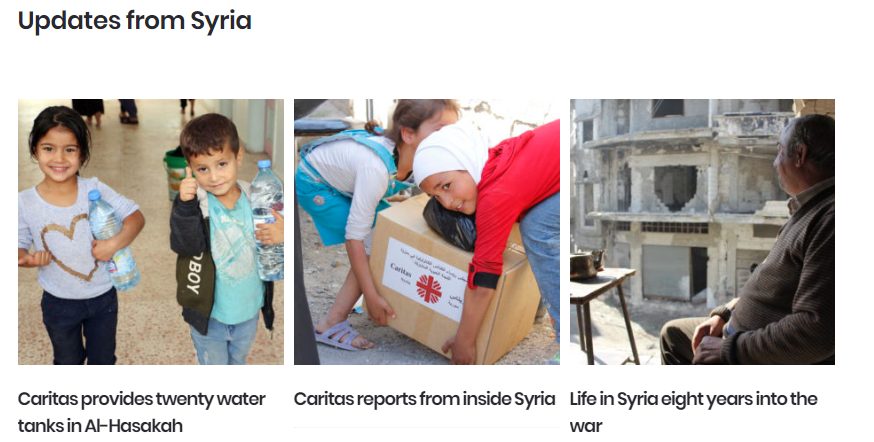
The consolidation of the Syrian Government’s hold in Idlib Province may not be to the liking of strategic hawks in Washington or Canberra. It is certainly better than the outbreak of a wider conflict in Syria which invites greater involvement by Russia.
Fitch Solutions (US credit rating agency operated by the Hearst Corporation) notes the advantages the first sustained economic growth in Syria since the depths of the civil war:
We at Fitch Solutions expect that an improved degree of political stability will allow the Syrian economy to expand in the coming months. We forecast real GDP growth of 6.5% in 2020 and 5.5% in 2021, from a forecast 5.9% in 2019. This would compare favourably to growth of 3.5% in 2018 and an annual average contraction of 9.8% over the preceding five years.
An improved security situation in large segments of the country will be the main factor underpinning economic growth. Regained government control of what is often referred to as ‘useful Syria’ (including coastal areas, Damascus and Aleppo) since mid-2019 will enable some level of reconstruction activity, mostly through projects sponsored by China, Russia and Iran. For instance, Iran-based MAPNA Group began construction of a USD450mn, 540MW power plant at Latakia in Syria in September, one of few projects that appear to be moving ahead at the moment.
Tentative Recovery for Syria – Real GDP Growth (Per Cent)
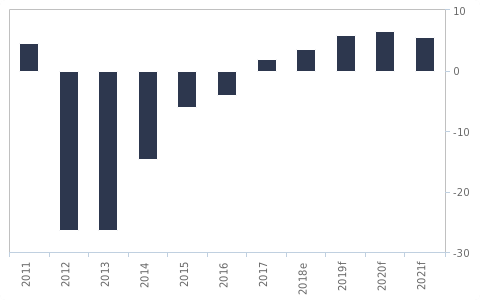
Stabilisation in oil production will also reduce the need to import fuel. Reconstruction work on oilfields in Raqqa province that came back under regime control on October will likely boost production levels in 2020, although the scale of investment required suggests that significant gains might have to wait until 2021. Meanwhile, output from oilfields in the Kurdish held north-east of the country will be supported by US military protection of the facilities. Despite a general withdrawal of US troops from Syria in October, the Pentagon has since committed to deploying troops to safeguard these facilities.
In keeping with this assessment, the New Year weather forecast for Damascus in 2020 is improving but spring is still a long way off (BBC Weather forecast):

 Denis Bright (pictured) is a member of the Media, Entertainment and Arts Alliance (MEAA). Denis is committed to citizens’ journalism from a critical structuralist perspective. Comments from Insiders with a specialist knowledge of the topics covered are particularly welcome.
Denis Bright (pictured) is a member of the Media, Entertainment and Arts Alliance (MEAA). Denis is committed to citizens’ journalism from a critical structuralist perspective. Comments from Insiders with a specialist knowledge of the topics covered are particularly welcome.
Like what we do at The AIMN?
You’ll like it even more knowing that your donation will help us to keep up the good fight.
Chuck in a few bucks and see just how far it goes!
Your contribution to help with the running costs of this site will be gratefully accepted.
You can donate through PayPal or credit card via the button below, or donate via bank transfer: BSB: 062500; A/c no: 10495969










14 comments
Login here Register here-
Moya -
Paul -
Chris -
Stella -
Tessa -
Adrian -
Tessa_M -
rubio@coast -
rubio@coast -
James Robo -
Pat -
Fair Go for Syria -
Lara G. -
Mark
Return to home pageHow did Tony Abbott justify those sloppy rules of engagement with the US Alliance that killed troops who were actually on the ground fighting Islamic State on behalf of the Assad Government? Perhaps Australians were too forgiving about Joe Hockey’s frightful 2014 austerity budget and this swelled the Abbott Government’s capacity to become more outrageous on the world scene.
Thanks Denis for your Australia First commitment to peace and the social market. But that is also an international objective for Australia as part of an independent and sustainable global order as welcomed by Gough Whitlam himself with the support of that tireless diplomat, Sir Les Patterson of course who was one of Gough’s Elves
Why cannot Australia take a more independent position in global affairs when RAAF air raids in Syria with the US Alliance mistakenly killed soldiers fighting against ISIL?
Denis, Thanks for an in-depth summary of Australia’s involvement in Syria and path to peace.
Definitely safer to report on Syria through Block Quotes rather than tender footsteps across Syria.Getting an occasional negative comment is sure better than a lucky strike on one of those Young Pioneer buses
Poor people what are they going through. There is no question Syria is a mess. Also it is understandable that only its neighbour countries and the big powers will get involve. It’s a stake that other countries, no matter how well economically developed they are, they just can’t handle it. It is very costly and dangerous for the people involved with the ground operations. The only way to deal with it, I see Australia and other countries to put pressure on UN to be more active and improve its ways on how to deal with crises like this. I simply don’t like the veto status Russia, China, France, UK and US have when it comes to a final decision made by UN. Otherwise, we will continue to see wars and huge civilian casualties all over the globe always.
Interesting article on Syria’s path to recovery.
Appreciate your international perspective, Adrian. Are you in Australia?
Perhaps its time to chill out on the Central Coast in Sydney, Adrian
A good read Denis – Here in the Page Electorate which was unexpectedly retained by the National Party despite that swing of 2.7 per cent against the Nations in Nimbin to what I believe is one of the lowest National Party votes in Australia of 6.4 per cent and a Labor-Green vote of 86.2 per cent after preferences.
Thanks for putting a light back on Syria. At times, the real plight of the people in countries like this become forgotten with the focus instead on the key political players.
Fair Go for Syria: What right do we have to topple a legitimate government?
People in Syria have had a rough time: Thanks Denis for your thoughts on their behalf in a well researched article
Very informative and interesting. Good to see Syria is slowly rebuilding itself amongst all it has faced, although as it rebuilds disputes between the Syrian, Russian and US government over oil fields are sure to rear their ugly heads. Best of luck to the future of Syria and its people